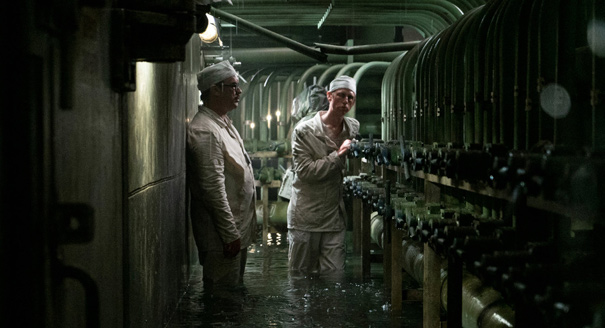Source: BuzzFeed
You already know that Chernobyl was beautifully crafted TV. What you might not have heard is how the show exposed a vulnerability in Russia’s propaganda machine — one that has existed for a long time, but is looking especially fragile these days.
That vulnerability is connected to what stirred Russian viewers the most about Chernobyl: that an English-language production for an American network got to write Russian history so powerfully. Many Russian viewers admitted HBO did a better job than Russian filmmakers would; one even noted that the first time he had seen people placing flowers by Moscow’s monument to the Chernobyl liquidators was after the show came out. His tweet was liked 18,000 times. A lot of Russians felt this way — they saw the show as a powerful tribute to the bravery of the liquidators, a point repeated in almost all reviews in independent Russian publications.
But Chernobyl’s narrative power wasn’t embraced by all. Since it dares to take responsibility for the truth and combat lies, it can’t help but crash up against modern Russia, with its troll factories, election interference, and fake news. The plot of Chernobyl goes on a kind of truth offensive, which can be viewed by Russian authorities as its own form of foreign interference. The fact that so many viewers accepted the show’s truth and approved of this foreign “interference” in Russian history is an alarming sign to some — a brazen challenge for the system.
It’s not surprising, then, that Russia’s propaganda machine rose to confront such a threat.
Hence the furious reviews in state-controlled domestic media, filled with disgust and hate toward the show. It is anti-Russian propaganda, they said, and it’s teeming with mistakes. They declared the show “Russophobia” and went through it with a fine-tooth comb for gaffes and inaccuracies, in the process misrepresenting both the show itself and the historical facts.
But Russia talks to the outside world in a different voice, and external Russian propaganda offered a different take. Russia Today praised the show’s artistic virtues, and was just a little upset at the lack of its full authenticity. Russia Beyond, the cultural subsidiary of RT, commended Chernobyl in all aspects in one article, and cautiously picked on a few details in another, still ending up with a positive evaluation.
The irony here is that a show about narratives, and the way they can turn sour, caused Russia’s own narrative machine to reveal some of its many contradictions.
There is the domestic narrative, for local consumption: that the West is trying to destroy Russia, and Russians are living in forced isolation because the US and Europe hate them. Then there’s the external narrative, made for foreign audiences tuning in to RT: that the world isn’t black and white, everything is complicated, and Russia is the only country opposing American hegemony — the last man standing who is brave enough to fight American imperialism.
Both these stories are false, of course. But while Russia’s opposition movement is fighting every day against the domestic narrative, there has been less effort to actively oppose the external one. If anything, the stories about Russian election interference and all-powerful meddling in America have fueled that myth and helped it grow.
Chernobyl is a sign of how fragile that external narrative really is, and if the world starts consistently testing the strength of this story, it may not survive. It has looked shaky in recent years: From attempts to spin the bungled Skripal assassination in England to the supposedly “invisible” Russian troops in Crimea and the vociferous denial of any US election interference, Russia has struggled to shape its story internationally.
That struggle is made even more difficult by the fact that it depends on Russians at home believing an equally questionable narrative: that the country successfully settles scores with its traitors, heroically liberated Crimea, and only cautiously celebrated Trump’s victory.
These systems of lies malfunction in the open world, and Chernobyl is a timely reminder of how it can come apart completely. Even as RT and Russia Beyond were praising the show, Western media reported the news that Russia is producing its own Chernobyl miniseries, one that blames US intelligence agencies for the disaster.
That show, if it’s ever made, would aim to support the domestic Russian narrative, and you wouldn’t hear about it from RT. It would also be a laughingstock. Regardless of what Americans have been told in recent years, there is no doubt that Hollywood is simply better at the narrative art than the Russian Foreign Ministry, Putin’s press operations, or RT.
Chernobyl, of course, was not anti-Russian agitprop, but the Russian propaganda machine can’t help but see the potential threat. For now, it’s just a show about 1986. But what if HBO commissions something about the Skripal poisoning, or the annexation of Crimea? Will Russia Today, whose editor-in-chief wrote a screenplay for the failed Crimean Bridge movie, be able to come back with a better narrative? These propaganda institutions remain powerful in the news business, but they can’t compare to the danger posed by something as well made as Chernobyl.
